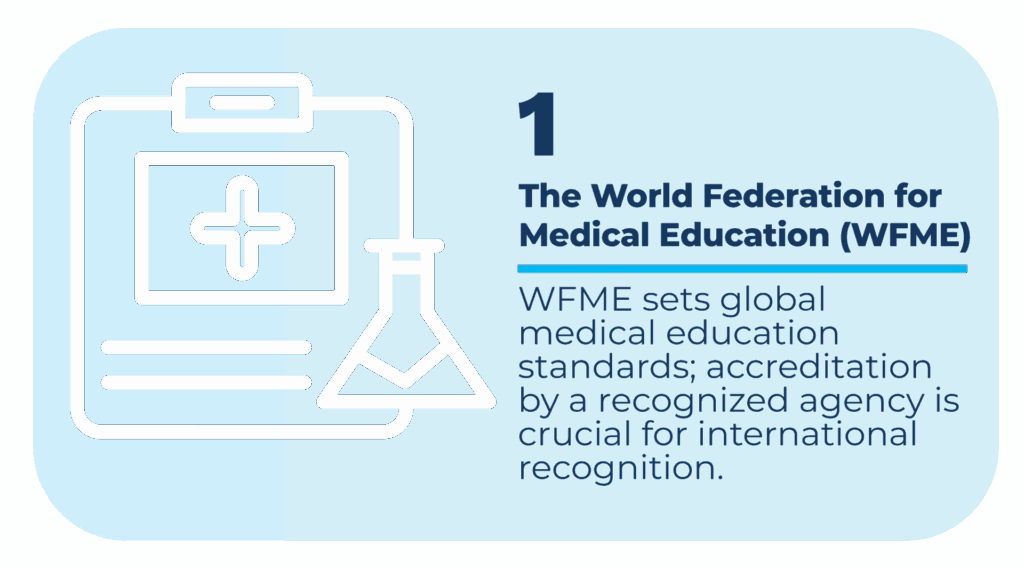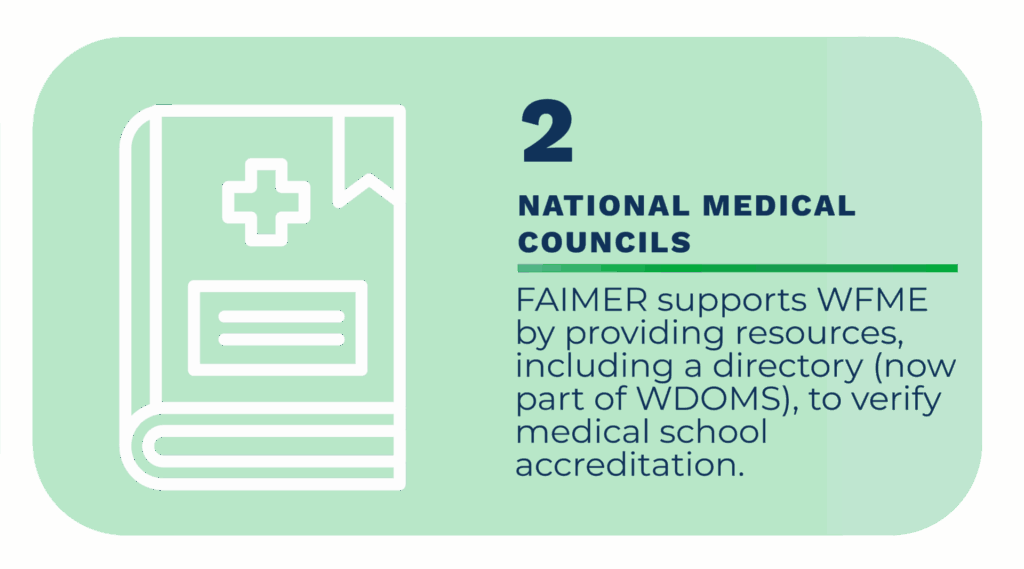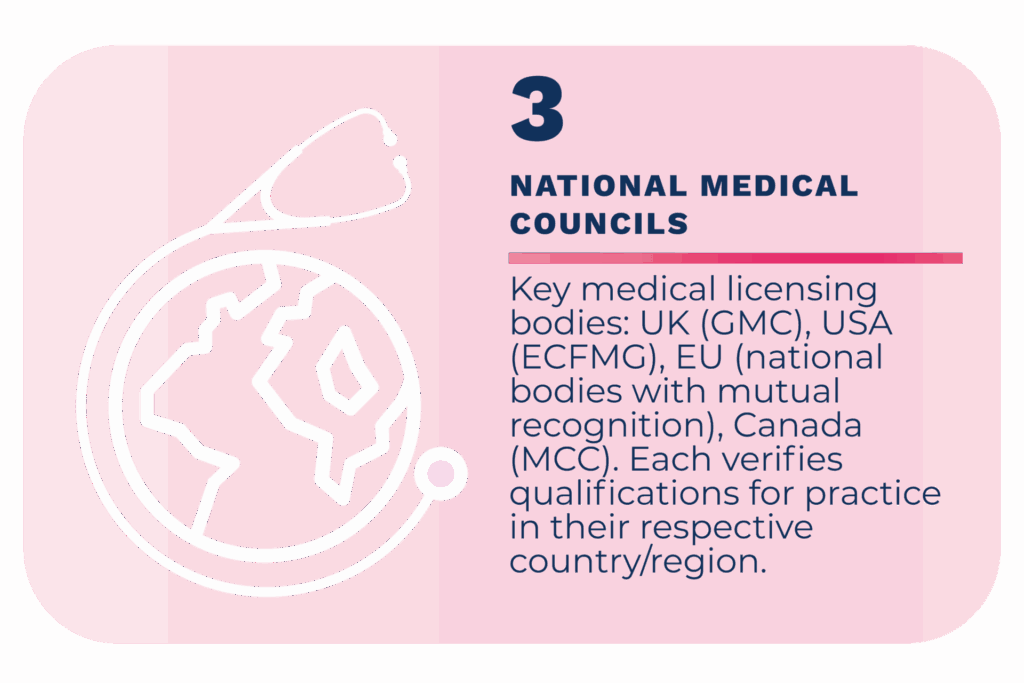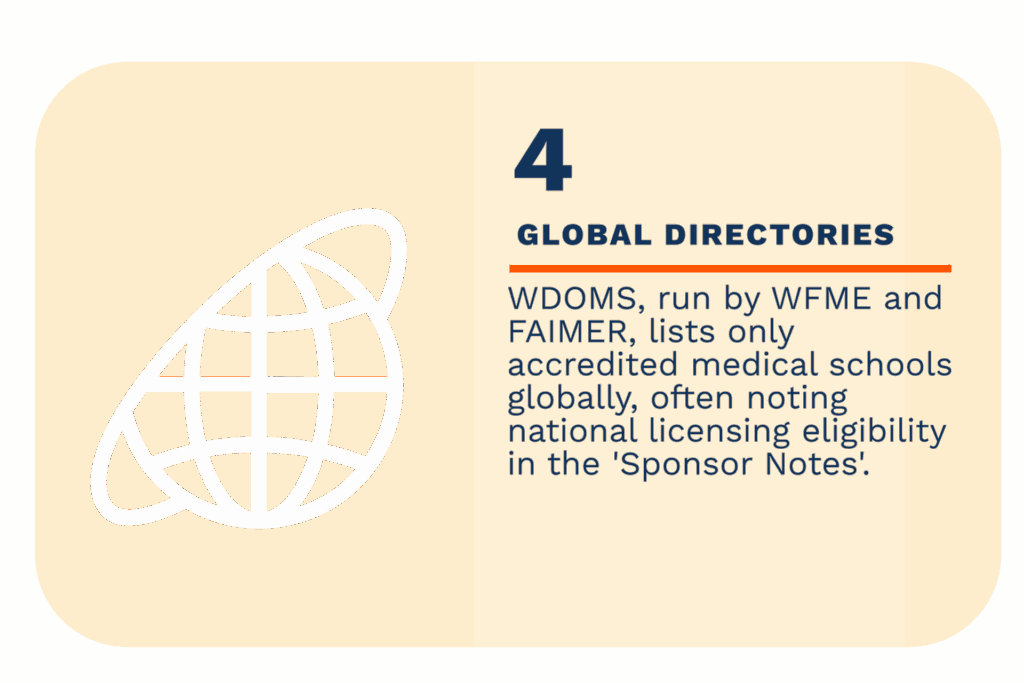The Accreditation and Recognition Organisations Every Medical Student Should Know


Imagine completing years of demanding medical education, only to find out that your degree isn’t recognised in your home country or where you plan to practice. Unfortunately, this nightmare scenario has happened to many unprepared students.
But how do you ensure the university you're considering meets global standards and aligns with your plans for the future? This is where university recognition and accreditation organisations come into play.
The key takeaways of this blog are:
- Verifying a university’s accreditation and recognition is critical to ensuring your degree is valid for licensing, postgraduate training, and employment.
- Accreditation evaluates the quality of a university’s programme on a national level, while recognition confirms its degrees are accepted internationally.
- WFME, FAIMER, GMC, ECFMG and WDOMS are vital for assessing medical universities’ standards and credibility.
Table of Contents
- 1 Accreditation vs. Recognition: What’s the Difference?
- 2 The Most Important University Accreditation and Recognition Organisations You Need to Know
- 3 Useful Links: How to Verify University Recognition and Accreditation on Your Own
- 4 How Medlink Students Can Help You
- 5 Trends in Medical University Accreditation/Recognition
- 6 Why This Matters to You
- 7 FAQ
Accreditation vs. Recognition: What’s the Difference?
When choosing a medical university, students often encounter the terms 'recognition' and 'accreditation' and mistakenly use them interchangeably. While closely related, they have distinct definitions and purposes in the world of medical education:
- Accreditation evaluates a university’s quality and standards on a national level, ensuring it provides high-quality education. Conducted by official accreditation bodies within a country, its primary goal is to ensure that a university or its programmes meet the national benchmarks. Some medical schools voluntarily seek additional accreditation from independent international agencies to enhance their credibility and global standing further.
Checking the accreditation status of your chosen university before applying is non-negotiable, as it forms the foundation of high-quality medical education. If a medical school isn’t accredited, it’s your sign to avoid it. - Recognition, on the other hand, confirms a university’s acceptance on an international level, ensuring its degrees are acknowledged and respected in different countries.
Recognition ensures that your medical degree is valid and widely accepted, allowing you to take on licensing exams, postgraduate training, and seek employment opportunities across the world.
If you would like to get an in-depth understanding of the difference between accreditation and university recognition, feel free to read our comprehensive blog: What is University Accreditation and Recognition?
The Most Important University Accreditation and Recognition Organisations You Need to Know
Checking whether a medical school is accredited usually means going to the official university site and looking directly for an ‘Accreditation’ tab, but it could also be under ‘Recognition’ or ‘Quality Assurance.’ You could also find out which accreditation body is responsible for the university and verifying directly, which usually means checking out:
1. The World Federation for Medical Education (WFME)


The WFME is an international organisation that works to improve and standardise the quality of medical education around the world. Accreditation by a WFME-approved accreditation body is crucial for universities, as it aligns their programmes with international standards.
2. Foundation for Advancement of International Medical Education and Research (FAIMER)


FAIMER collaborates with WFME and provides resources like the International Medical Education Directory (which is now part of WDOMS), helping students confirm the accreditation of their medical schools.
Meanwhile, if you want to check whether your degree will be recognised in your home country or the destination where you want to become a doctor or dentist, it’s best to check out:
3. National Medical Councils


Here are the top local medical councils or boards that govern medical licensing and ensure degrees meet the standards required for practising in their respective countries.
- UK: General Medical Council (GMC) - ensures your degree allows you to register as a doctor in the UK.
- USA: Educational Commission for Foreign Medical Graduates (ECFMG) - essential for practising in the United States.
- EU: National Accreditation Bodies - each EU country has its own council, but being EU-accredited often means mutual recognition among member states.
- Canada: The Medical Council of Canada (MCC) - verifies the credibility of medical degrees for Canadian licensing.
4. Global Directories


- World Directory of Medical Schools (WDOMS): a list which includes only accredited medical schools from around the world. Often, you can also find in the ‘Sponsor Notes’ tab whether national medical councils have recognised the university, giving eligibility to practise there upon graduation.
WDOMS was originally established by the World Health Organisation (WHO) but is currently being managed via a partnership between WFME and FAIMER.
You can get our infographic PDF file that summarizes the key accreditation and recognition organizations mentioned in this section.
Useful Links: How to Verify University Recognition and Accreditation on Your Own
If you want to directly check whether a university is accredited and has the recognition you need for your future career, you can use the following links:
- WDOMS Search
To check if a university is listed in WDOMS, all you need to do is enter its name (or part of it) into the search bar. You can also browse by country and check whether you can find it that way. - WFME’s Database
It showcases an interactive map that lets you highlight universities to check which accreditation bodies are responsible for verifying the quality of education in the country. - FAIMER Directory
Here, you can check a comprehensive list of the organisations that accredit and recognise medical schools. When you find the org you’re looking for, you can search for it and then use it to see whether the medical school you’re interested in is accredited/recognised. - GMC Criteria for Medical Education Abroad
Here, you can check what are the requirements for your medical degree to be recognised in the UK. - ECFMG Requirements:
Useful for students aiming to become doctors in the US.
However, manually checking each and every one of the universities you’re interested in can take hours or even days.
How Medlink Students Can Help You
Medlink Students has created a list of the 100+ Best Medical Schools In Europe and the Caribbean. All of these universities provide high-quality medical education in English that is both accredited and recognised.
Additionally, we offer free consultations with our academic advisors, who can guide you toward choosing the perfect university that will let you become a successful doctor or dentist.
Our expert advisors have an in-depth understanding of accreditation organisations and medical councils in different countries. Here’s how we make it easier for you:
- Background checks done right: we conduct thorough research to ensure your chosen university meets global and national standards.
- Personalised recommendations: based on your career goals, we suggest top-tier universities recognised by key organisations like WFME, GMC, and ECFMG.
- Comprehensive guidance: from understanding recognition requirements to completing your applications, we’re with you every step of the way.
With our support, you can rest assured that your degree will allow you to become a successful doctor or dentist anywhere in the world.
Trends in Medical University Accreditation/Recognition
The world of medical education is always changing and evolving. This includes not only new treatments and technologies that are being developed but also how universities are accredited and recognised globally.
Here are some key developments you should know:
WFME’s Growing Influence
Soon, the World Federation for Medical Education (WFME) will play a pivotal role in ensuring that medical schools meet standardised global standards. This initiative aims to reduce disparities in medical education quality across countries.
A proposed change is for students who want to practice in the USA to be eligible for ECFMG certification only if a WFME-approved body accredits their university. This change is expected to bring clarity and confidence to students worldwide.
Globalisation of Medical Education
As the demand for doctors grows worldwide, countries are increasingly collaborating to establish mutual recognition agreements for medical degrees. For example:
- Within the European Union, medical degrees from accredited universities are often recognised across member states.
- Discussions are underway to establish similar agreements between countries in regions like Asia and the Middle East.
Why This Matters to You
Choosing the wrong university can have devastating consequences for your medical career. Imagine investing years of hard work and substantial financial resources, only to find out that your degree is worthless in the country where you want to practice. The worst thing is that this is a harsh reality that many unprepared students have had to face.
Without getting an accredited and recognised medical education, you risk being ineligible for licensing exams, unable to pursue specialisation or residency programmes, or even worse, being unable to practise medicine at all.
The simple solution? Just make sure you’re applying to a high-quality medical school that will open doors to a successful career as a doctor or dentist.
FAQ
1. What is the difference between accreditation and recognition?
Accreditation evaluates the quality and standards of a university or programme on a national level. Recognition confirms that a university’s degrees are accepted and respected internationally, enabling graduates to pursue licensing exams, postgraduate training, and employment in various countries.
2. Why is accreditation important for medical students?
Accreditation ensures that the medical school you attend provides high-quality education. Without accreditation, your degree may not be valid for licensing or further medical training in your home country or other destinations.
3. What are the most important accreditation organisations for medical universities?
Key organisations include:
- The World Federation for Medical Education (WFME)
- Foundation for Advancement of International Medical Education and Research (FAIMER)
- General Medical Council (GMC) in the UK
- Educational Commission for Foreign Medical Graduates (ECFMG) in the USA
4. How can I verify if my chosen medical university is accredited or recognised?
You can check:
- The university’s official website (look under 'Accreditation', ‘Recognition, or 'Quality Assurance').
- WFME’s accreditation directory.
- National medical councils for country-specific accreditation details.
- The World Directory of Medical Schools (WDOMS).
5. What happens if a university is not accredited or recognised?
Attending an unaccredited or unrecognised university can invalidate your degree, making it impossible to register for licensing exams, complete postgraduate training, or secure employment as a doctor in most countries.
6. How do I ensure my degree will be valid in my home country or where I plan to practice?
Research the specific requirements of the medical council in your desired country. For example:
- For the UK, it’s the General Medical Council (GMC)
- In the USA, it’s ECFMG.
- In Canada, you need to check with the Medical Council of Canada.
7. What role does the WDOMS play in medical education?
The World Directory of Medical Schools (WDOMS) is a global database that lists medical schools and provides information about their recognition and accreditation status. It is a reliable resource for verifying the credibility of a medical school.
8. How can I be sure that a university is right for me?
Contact Medlink Students for personalised support and guidance on choosing the right medical school and ensuring your degree meets all necessary accreditation and recognition standards.
Leave a Reply


About Medlink Students
Leading international recruitment company for medical students in Europe. British Council Certified Agents. 10+ years of experience and more than 10,000 students advised.








